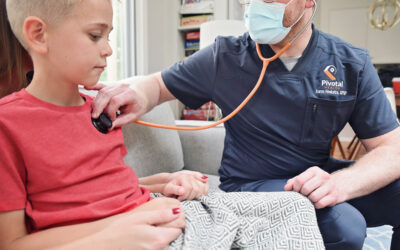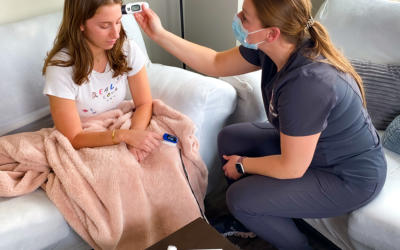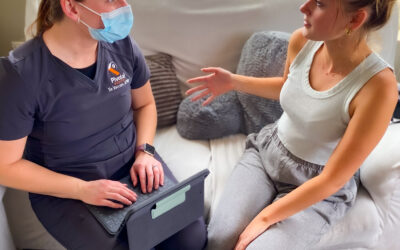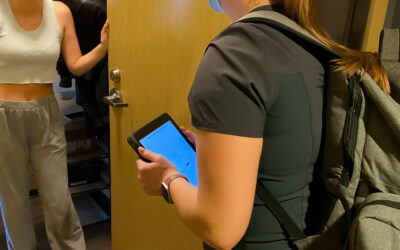Coronavirus disease (COVID-19) is caused by a virus known as SARS-CoV-2. Symptoms may include fever, cough, and shortness of breath. It mainly spreads via air droplets from coughing, sneezing, and breathing.
Many people have mild symptoms and can manage their symptoms and recover at home. However, sometimes symptoms progress to the point of requiring medical care and even hospitalization. Currently there are not widely available medications to fight the virus.
COVID-19 is highly transmissible and if you are infected it’s important to not spread the virus to others. If you have COVID-19, wear a face covering any time you are around other people. You need to remain in isolation while you are sick. Your doctor or local public health official will tell you when you no longer need to be isolated. Leave your home only if you need to get medical care.
Follow-up care with a medical provider is a key part of your treatment and recovery from COVID-19. Be sure to make and attend all appointments and call your doctor if you are experiencing problems.
How can you care for yourself at home?
- Get plenty of rest. Rest helps your body to fight the virus.
- Drink plenty of fluids. This helps replace fluids lost from fever. Fluids also help ease a scratchy throat. Water, soup, fruit juice, and hot tea with lemon are all good choices.
- Take acetaminophen (such as Tylenol) to reduce a fever. It may also help with muscle aches. Read and follow all instructions on the label. Be careful not to take too much — pain relievers like acetaminophen often are included in cold medicines, too, so it’s important to pay attention to how much you are taking.
- Sponge your body with lukewarm water to help ease discomfort from fever. Don’t use cold water or ice.
- Use petroleum jelly or another barrier moisturizer on sore skin. This can help if the skin around your nose and lips becomes sore from rubbing a lot with tissues.
Watch closely for changes in your health, and be sure to contact your provider if:
- Your symptoms get worse.
- You are not getting better as expected.
When should you call for help?
Seek emergency care immediately if you are experiencing any of the following symptoms:
- Difficulty breathing, to the point you are unable to talk
- Constant chest pain or pressure
- Severe dizziness or lightheadedness
- Confusion
- Bluish color in your face and/or lips
- Loss of consciousness or severe listlessness
- Pale, cold, or clammy skin
- Coughing up blood
- Severe dehydration
Tips for isolation if you do have COVID-19
- Wear a face covering when you are around other people in your home. It can help stop the spread of the virus via air droplets.
- Limit contact with people in your home. If possible, stay in a separate bedroom and use a separate bathroom.
- If you must leave home, avoid crowds, and try to stay at least 6 feet away from other people.
- Avoid contact with pets and other animals.
- Cover your mouth and nose with a tissue when you cough or sneeze. Then, throw it in the trash right away and wash your hands.
- Wash your hands often using soap and water, scrubbing for at least 20 seconds. If soap and water aren’t available, use an alcohol-based hand sanitizer. Don’t share personal household items such as bedding, towels, cups, glasses, and eating utensils.
- Wash laundry in the warmest water allowed for the fabric type and dry it completely. It’s okay to wash other people’s laundry with yours.
- Clean and disinfect your home every day. Use household cleaners and disinfectant wipes or sprays.
- Take special care to clean things that you and those you live with touch regularly. These include doorknobs, remote controls, phones, and handles on your refrigerator and microwave. And don’t forget countertops, tabletops, bathrooms, and computer keyboards.
The Centers for Disease Control and Prevention (CDC) provides this calculator for quarantine and isolation recommendations.
Call Pivotal Health for Your COVID-19 Concerns
Pivotal Health providers can administer rapid antigen tests with results in just 15 minutes, or PCR lab tests with results in 1-3 days to determine if you have COVID-19. We also will do a full assessment of vital signs, breathing concerns, and other symptoms associated with COVID-19. We will then discuss a plan for care with the patient, which may include prescription medications and follow-up appointments. Remember to always seek emergency medical care if you have trouble breathing.












